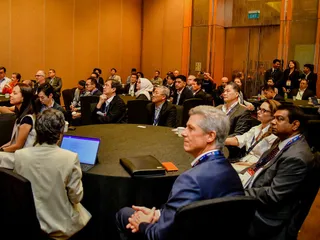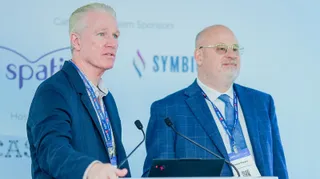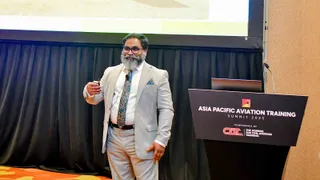APATS 2025: Gen Z Demands New Training
Contact Our Team
For more information about how Halldale can add value to your marketing and promotional campaigns or to discuss event exhibitor and sponsorship opportunities, contact our team to find out more
The Americas -
holly.foster@halldale.com
Rest of World -
jeremy@halldale.com

Key Takeaways
- A shortage of 250,000 skilled mechanics is projected in the APAC region over the next decade.
- Gen Z trainees (ages 15-30) now dominate maintenance training programs across the region
- Most of traditional teaching methods are perceived as "too chalk and talk" by Gen Z students
- Technical competency remains high, but behavioral and interpersonal skills need development
- Stress management and attention to detail are identified as key areas requiring improvement
- The new generation prefers hands-on experience, group work, and scenario-based learning
- Training providers must shift from pure instruction to a formative mentoring approach
At the Asia Pacific Aviation Training Summit (APATS) 2025 in Singapore, Laura Diedrich, Head of Lufthansa Technical Training Operations Asia-Pacific, presented explorative research on adapting maintenance training for Generation Z. Her presentation explored whether the industry needs to transition "from a pure training approach to a more formative approach in entry-level Maintenance Technician programs."
The Growing APAC MRO Landscape
Diedrich opened by highlighting the region's strength and growth potential. "The APAC region is already strong when it comes to MRO, or even the strongest globally, and we are seeing it grow," she noted.
The Philippines, in particular, is strengthening its MRO ecosystem with new airports in Bulacan and Cavite, the modernization of Metro Manila facilities, and the expansion of Clark Airport.
This growth makes workforce development critical. With expectations of roughly a quarter-million shortage of skilled mechanics within the next decade, recruiting, qualification, training, and retention have become more crucial than ever.
Understanding the Gen Z Workforce
Generation Z now dominates aviation maintenance training. "Almost everyone that you see in aircraft maintenance training today, on the entry level, but also increasingly in type and basic training, is part of Gen Z," Diedrich explained, defining this as individuals aged 15-30.
While acknowledging that Gen Z grew up in prosperity and with mostly very good relationships with their families and parents, Diedrich emphasized a crucial factor: they came of age during the pandemic. This experience, she believes, will have long-term effects, creating "a mixed pattern" of enhanced digital skills alongside potential gaps in interpersonal and behavioral competencies.
The Lufthansa Technical Training Case Study
Company Background
Lufthansa Technical Training Philippines functions as a fully owned branch with multiple certifications, including EASA approval and local Philippine certification. The company employs 25 multi-rated instructors across all generations, operates two fully equipped training centers in Manila, and provided roughly 6,000 training days last year.
The Maintenance Technician Program Bridge
The Maintenance Technician Program (MTP) serves as "a bridge between academia, on the one hand, and industry needs, and specifically company needs on the other hand."
Diedrich explained that while Philippine aviation college graduates arrive with "really, really high level of technical knowledge and understanding," they often lack hand skills on the one hand, and, of course, company procedures and also the right mindset and social skills.
The program addresses this through six-month courses inspired by German vocational training, adapted to local standards and specialized tracks including avionics, electrics, airframe, and power plant.
The Research Methodology
Facing conflicting feedback from customers about graduate competencies, Lufthansa Technical Training conducted a comprehensive study examining three key questions:
- Strengths and weaknesses in MTP graduate competencies
- Effectiveness of current teaching methodology for Gen Z learners
- Optimal methodology to help Gen Z develop their full potential
The research employed stakeholder interviews with customer representatives, training surveys with trainees, and classroom observations for objective assessment.
Critical Findings
Technical Excellence, Behavioral Gaps
The study revealed that technical competency is perceived as very high, confirming the program's success in developing technical skills. However, significant gaps emerged in behavioral and interpersonal competencies.
Particularly concerning were findings about stress management and attention to detail. Diedrich noted that compared to other generations, "stress management, for instance, was a bit lower, but also attention to detail, which might nicely fit to...the eight second attention span."
Teaching Method Misalignment
Despite overall trainee satisfaction, a critical disconnect emerged regarding teaching approaches. Traditional methods that "have worked really well for us in the last 20 years are perceived by the Gen Z trainees as to be a bit too traditional, too chalk and talk."
Learning Preferences
Gen Z trainees clearly communicated their preferred learning methods, seeking more hands-on experience, group work, scenario-based learning, simulation or real aircraft access if possible. Crucially, they demand purpose-driven learning: "they need to always feel the purpose why they should learn something. They will not accept you teaching them something because you are the instructor."
The Three-Pillar Response Strategy
Based on these findings, Lufthansa Technical Training identified three focus areas:
1. Maintain Technical Excellence with Enhanced Practice
"We needed to keep the level of technical competency high," Diedrich emphasized, while enriching programs "with more hands-on practice and where this is not possible, do more simulation."
2. Integrate Behavioral Development
Rather than creating separate behavioral training modules, the team decided to "integrate training behavioral competencies more into the technical training that is already happening, with learning nuggets that can be integrated all the time."
3. Transform Instructor Roles
Perhaps most significantly, they recognized the need for a paradigm shift in our own instructors, to go from teaching or training to more towards formation of the trainees, because this is what they expect. They expect guidance, they expect mentoring, they expect personal growth.
The Elevate Program
To address instructor development, Lufthansa launched an internal program called "Elevate," designed to upskill instructors in more engaging and modern teaching methodology that is not only suited to Gen Z, but to all generations.
Study Limitations and Broader Implications
Diedrich acknowledged several limitations in her exploratory study. The research was Gen Z-specific, meaning in theory: it could have happened that if we asked about other generations of graduates, we could have received the same results.
However, she argued this limitation doesn't diminish the urgency: "Even if it was that way, we would still need to adapt to them, because they in the end, they are our end customers at the moment."
Future Industry Implications
The presentation highlighted several factors driving change beyond generational differences. Rising aircraft complexity requests stronger interpersonal and behavioral skills, because working on those aircrafts means stronger collaboration and teamwork.
Gen Z brings valuable strengths, particularly when it comes to digital savviness and working with simulations, they are so much more apt at doing this than other generations, she highlights.
A Call for Industry Adaptation
Diedrich concluded with a powerful message about the need for comprehensive training evolution. "We think we need training for head, hand and heart," she stated, emphasizing that as aircraft complexity increases, "the focus on behavioral skills, because they require more collaboration, will become stronger."
Her final recommendation emphasized the universal benefits of adaptation: "Other generations of learners will also be thankful if we do, because they will benefit from modern teaching methods, and Gen Z will be the audience for advanced training programs in the next 5 to10 years to come. So we better prepare now.”
The research demonstrates that successful maintenance training programs must understand specific competency requirements, derive appropriate methods from those requirements, and integrate behavioral development throughout technical instruction rather than treating them as separate domains.


